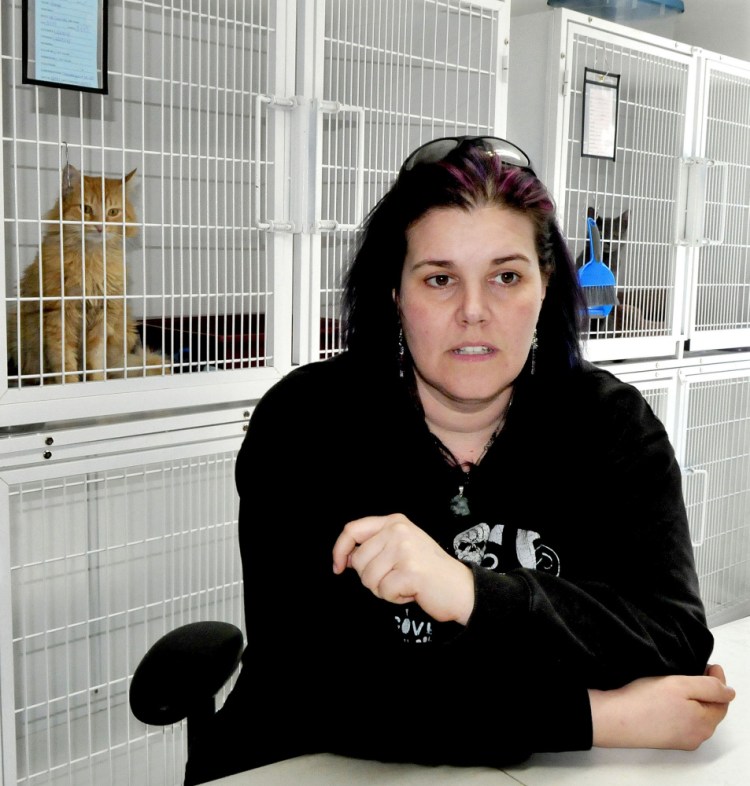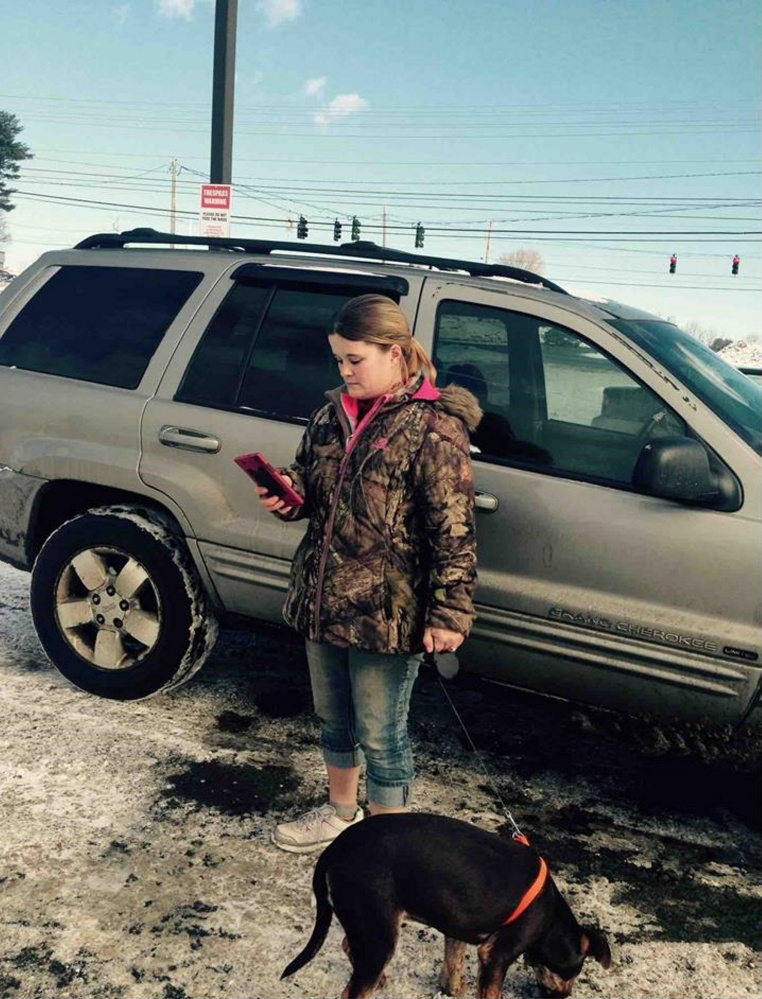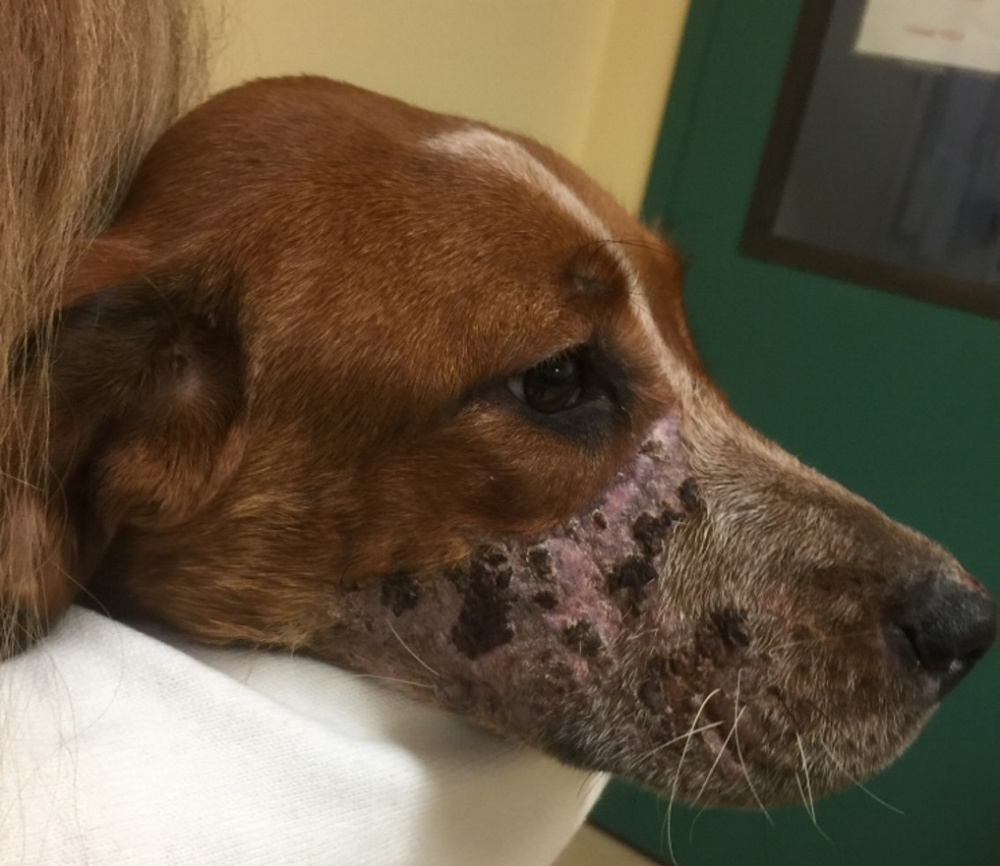SKOWHEGAN — Before walking into Nicole Bizier’s garage on March 17, Detective Katelyn Nichols hadn’t worked on an animal cruelty case.
“It was disturbing, walking into the garage and seeing dogs basically stacked in cages,” said Nichols, who works for the Skowhegan Police Department.
Authorities began investigating Bizier, 32, earlier in March, when the state Animal Welfare Program received an animal cruelty complaint for a stray dog found in Pittsfield. The state agents determined that Bizier last owned the dog, which had severe tissue damage around its mouth from wearing a muzzle for a long time.
Agents found that Bizier was still allegedly selling dogs online, something authorities ordered her to stop doing in February when she was arrested for tampering with public records and faking private records.
In mid-March, state agents and Skowhegan Police executed a search warrant at Bizier’s home, where they allegedly found 11 dogs in poor conditions, and arrested her on multiple charges.
At this point, it sounds like Bizier was “pet flipping,” Nichols said. Pet flipping is when someone gets an animal for free and then turns around and sells them. While Nichols said she’s never seen this type of behavior before, she suspects it may happen more often than people realize.
Typically, those who “flip” pets are stealing them, said Brandi Hunter, vice president of public relations and communications at the American Kennel Club.
Someone will let a dog play in the yard or leave it tied up outside a store while running errands, and the dog will be stolen. The club has even heard of people stealing dogs from cars, Hunter said, though she added that not every theft is about pet flipping.
According to the club’s National Pet Theft Database, the number of stolen dogs has increased dramatically since 2008, when 71 were reported stolen. In 2015, 831 dogs were stolen.
While there is no data on dogs stolen in Maine, Natalie Messier, president of the nonprofit Maine Lost Dog Recovery, said they received 804 reports of lost dogs in 2015 and 12 percent were unaccounted for. In 2016, the number of reports increased to 924, and 11 percent are still unaccounted for.
Messier said if people find a stray or lost dog, they must report it to the local authorities. If they keep it without doing so, that’s against the law, she said.
With this case, however, it seems that Bizier was getting the dogs for free from people who were looking to re-home them. Nichols said a number of possible victims have come forward, as well as a number of people who say they gave her their animals, thinking they were going to a good home.
On average, Bizier was selling the dogs for $250 to $500, Nichols said.
Bizier was charged with theft by deception, cruelty to animals and illegal operation of a pet shop. She was taken to Somerset County jail in East Madison, where she got out on bail for $500. Attempts to reach Bizier for comment were not successful.
‘HARD TO BELIEVE’
Nichols was one of the Skowhegan Police officers who took part in the search of Bizier’s home.
The one-car garage, which held tools, yard equipment and toys in addition to the four adult dogs, was very cold, Nichols said, and had no form of heating. The dogs were in cages that gave them just enough room to turn around, she said, and they didn’t have water or food bowls. The cages had hay and some had dog beds, but those were “so dirty they almost looked brown,” according to Nichols.
The space smelled like “urine and dirty animals,” which was accurate, as the dogs were relieving themselves in their cages.
While Nichols was in the garage, another Skowhegan officer called her saying there were puppies locked in a closet.
Nichols, who has a dog herself, was shocked.
“It’s hard to believe a human being could keep animals locked up in a closet,” she said.
Inside the house where Bizier lives, which is a small single-wide trailer in Skowhegan, it smelled “like old food and animal urine,” Nichols said. There was clutter everywhere.
“It was very, very dirty inside,” Nichols said. “It was not a place I would choose to live.”
In the home’s only bathroom, police found four puppies in the bathtub. They had a blanket, but it was soaked in urine. There was a bowl of wet cat food and no water bowl.
“It looked like they were expected to drink from the dripping faucet,” Nichols said.
It seemed the 4-week-old puppies were not allowed to leave the tub. They acted lethargic, she said.
“Normally, puppies at 4 weeks old, they’re excited and jumping around. But these seemed exhausted,” Nichols said.
In a house closet three more puppies were found. The total space for the dogs was about 2-feet-by-2-feet when the door was closed with a small cardboard box filled with cat litter, which they didn’t use.
The puppies slept through the transfer from Bizier’s residence to the Humane Society of Somerset County, Nichols said.
The mother pitbull “started wagging her tail and was very happy” when the police started to take her out, she said. The dog was malnourished and was supposed to be nursing. It needed a great deal of medical attention once at the Humane Society.
The other adult dogs were very scared, Nichols said, and the police had to ask Bizier and her boyfriend to help take them out of the residence.
“It broke my heart,” Nichols said. “Animals and children, you know, they’re defenseless and unless someone speaks up for them, they’re on their own.”
Nichols said they’re working with the Somerset County District Attorney’s Office regarding further charges, but after that it’s up to the court system.
“I honestly don’t know what her motive was,” Nichols said. It could have been money, but it hasn’t been determined.
BUYER BEWARE
Pet flipping is not a new crime, according to the American Kennel Club’s Hunter.
“The prevalence of the internet makes it more visible,” she said. With pet shopping and selling a click away on sites like Craigslist, it’s something almost everyone can access.
Breeders, shelters and pet stores have to post license numbers online by Maine law, according to Liam Hughes, director of the Animal Welfare Program since 2011. If they don’t have the numbers, people should avoid them.
“We have these rules and laws set up for the people in the state of Maine so they can get what they want when they look for a pet,” he said. “I would really caution anybody when they go on Craigslist or any other website.”
According to Craigslist’s terms of use, pet sales are prohibited on the website, though it does allow people to “re-home” their pets for a small fee.
If people do buy a pet that was advertised online, Hughes suggests documenting as much as possible during the meeting — the seller’s license plates, the sellers themselves and any contact information. Buyers should also contact the local animal control officer if they feel something is wrong with the situation.
“If you’re looking for a new pet, you should not be buying it late at night in a parking lot somewhere for cash,” Hughes said.
After buying a pet from an online seller, people should bring it to a veterinarian, he said, and contact local police if they think they were lied to about the pet’s vaccinations or age, among other things.
For those who need to give up a pet, people shouldn’t be afraid to visit the local animal shelter.
The euthanasia rate for Maine shelters in 2015 was only 5 percent, according to the Animal Welfare Program’s website, a large decrease from 2011 when the rate was 27 percent.
“Over 90 percent of animals in shelters are walking out into forever homes,” Hughes said, so people shouldn’t picture the stereotypical pound when they think of a shelter. Shelters like the Humane Society’s are also usually willing to help people who become unable to care for their pets, he said, whether due to lifestyle or economic issues.
At the Humane Society of Somerset County, Bonnie Brooks, the community outreach coordinator, said its euthanasia rate has decreased dramatically while its number of surrenders has increased.
“If they come here, we’ll give them a chance for sure,” Brooks said. “We try really hard to work with the public to take surrenders. It depends on how full we are with strays, which are the first priority.”
The shelter gets the most surrenders from people who are losing their home or changing apartments and won’t be allowed to keep a pet.
They do draw the line at dogs who have a bite history, she said, because dogs with aggression issues won’t get better in shelters.
Overall, Brooks said the old stereotype of a shelter doesn’t fit them anymore. The shelter provides veterinary care, works with animals that have fear and health issues, and tries to fit people with the right pet for their personality and lifestyle, she said.
“If you’re having a hard time with your animal, give us a call and see if we can help you,” she said. “We love the animals that are here.”
In contrast, when selling online, people can never be sure where the pet will go.
“A lot of times people that are giving animals away free to a good home, it’s luck of the draw,” Hughes said.
A DIFFERENT SCALE
The animals found in the Bizier case are now in state custody, Hughes said. Nichols said they are no longer at the Humane Society, but she could not disclose their current location.
“We’re going to do everything we can to make sure that those animals are healthy or they stay healthy,” he said.
The state will ask for custody at a possession hearing, Hughes said, and then work toward getting them out of the shelter system and into “forever homes.”
However, if the dogs have behavior issues, which often happens with animal cruelty cases, they may have to remain in the system longer for training, Hughes said.
“They may always carry emotional scars afterwards based on the treatment they received,” he said.
Hughes once had a dog that was afraid of feet, for example, he said. If a foot touched it in a certain way, it would react because the previous owner had kicked it a lot.
Bizier was first arrested in February after the Animal Welfare Program, which is part of the state Department of Agriculture, Conservation and Forestry, received four complaints from people who bought dogs to later find out they were not properly vaccinated.
Some town clerks and veterinary technicians had caught on to the false records, Hughes said. State agents from the program examined the documents and determined they were fake.
Falsified rabies certificates “was something new for us. We’d never really seen it before,” Hughes said.
Agents set up a purchase with Bizier, who also used the names Sarah Landcaster and Sara Plummer. She was arrested on two misdemeanor charges for the alleged crimes. She was also given a notice to comply and ordered to stop selling dogs, cats, puppies and kittens.
Every case the program deals with is unique, Hughes said, but this one was especially so.
Bizier was possibly selling animals to people and telling them the dog was 10 months old when it was actually 10 years old, he said.
“I don’t think we’ve ever really dealt with anybody doing it on the scale that she was doing,” Hughes said.
While Hughes said information was still being gathered on the case and couldn’t say exactly how many dogs Bizier had sold, he did say that people had called to say Bizier sold them a dog in 2015. The authorities still have to verify the information they gather, he said.
Hughes said investigators are interested in hearing the stories of those who bought dogs from Bizier, but are not interested in taking the dogs from their homes.
Those who suspect they may have bought a dog from Bizier can report it to the Skowhegan Police Department.
Madeline St. Amour — 861-9239
mstamour@centralmaine.com
Twitter: @madelinestamour
Send questions/comments to the editors.






